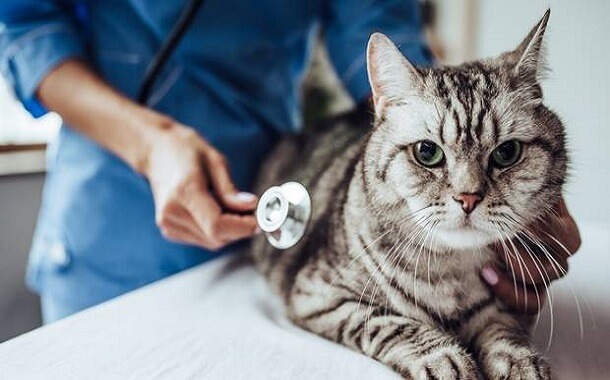How Much Does a Cat Abortion Cost?
Last Updated on February 15, 2024
Written by CPA Alec Pow | Content Reviewed by ![]() CFA Alexander Popinker
CFA Alexander Popinker
Terminating a feline pregnancy is an emotional and complex decision for any pet owner. When an unexpected cat pregnancy occurs, understanding the costs involved with spaying or aborting the cat is an important part of the decision-making process.
This article provides a comprehensive overview of the typical costs pet owners can expect when pursuing pregnancy termination services from a licensed veterinarian.
How Much Does a Cat Abortion Cost?
The cost of a cat abortion can range quite a bit, from around $100 on the low end up to $500 or more in some cases. The average seems to be around $250-350 according to most veterinary sources. However, many factors play a role in determining the final costs.
Some elements that influence pricing include:
- Stage of pregnancy – The farther along the cat is, the higher the complexity and risks, driving costs up. Early abortions tend to be cheaper.
- Location – Prices vary regionally based on the clinic’s rates and local economies. Urban clinics often charge more.
- Additional care needed – If the cat has health issues or complications arise, additional medications, hospitalization, etc. will increase costs.
- Type of clinic – Emergency or specialty clinics often cost more than a local spay/neuter clinic. Non-profits sometimes offer lower pricing.
Ultimately, pet owners should expect to budget $200-500 for a cat abortion procedure. The vet will provide an accurate quote after examining the feline patient.
According to Cat Bandit, the average cost of a medical abortion for a cat is around $300-$800. The cost of medical abortion is a non-surgical method of terminating a pregnancy in cats and can range from $100 to $300. The cost of a surgical abortion for cats is around $400-$1,200.
Love Petly notes that the average cost of a cat abortion can range from $50 to $300. Factors affecting the cost include veterinary fees, geographical location, gestation stage, and the need for additional medications or treatments. The cost can vary depending on the location, the vet’s expertise, and the stage of pregnancy.
Overview of Feline Abortion Procedures
Before delving into the costs, it is important to understand what is involved in feline abortion procedures. There are two main options:
- Spaying – This procedure is the surgical removal of the uterus and ovaries, the same as a routine feline spay. When done during early pregnancy, it will terminate the kittens. This is the preferred method for abortion when possible.
- Medication – Drugs like prostaglandins may be used to induce delivery of non-viable fetuses, typically in later-term pregnancies. This often requires hospitalization.
Veterinarians will determine the best approach based on factors like gestational stage and the cat’s health status. Both methods do require anesthesia and carry surgical risks. Spaying or aborting a pregnant cat is generally more complex than a routine spay.
Ethical concerns may arise around cat abortion. However, responsible pet owners ultimately must make a decision in the best interest of the cat’s health and wellbeing. Avoiding unwanted litters helps curb cat overpopulation and benefits feline welfare overall.
Factors That Influence Feline Abortion Costs
Several important factors come into play when determining the costs of spaying or aborting a pregnant cat. Here is an overview of some major considerations:
Stage of Pregnancy
The gestational stage of the cat significantly impacts the price of pregnancy termination. Early abortions are generally easiest and cheapest for vets to perform.
Costs tend to increase later in the term, as the developing kittens get larger and the uterus changes. Late-term abortions sometimes require a C-section and extensive aftercare for the queen.
Health Status of the Cat
Like any surgery, the cat’s overall health plays a big role. Cats with complicating health conditions or diseases may need additional care, driving up costs.
Older cats or those in poor health will likely land on the higher end of the price spectrum due to increased risks and care needs. Young, healthy cats are ideal candidates for more affordable abortion prices.
Type of Veterinary Clinic
The type of clinic performing the abortion influences pricing as well. Full-service veterinary hospitals and emergency clinics often charge higher rates due to greater overhead costs.
Spay and neuter clinics or non-profit organizations, on the other hand, may offer more budget-friendly options for owners, sometimes as low as $100-150 in some areas.
Geographic Location
Where the clinic is located geographically tends to impact prices too. Veterinary care in expensive urban areas like New York or San Francisco comes at a premium.
Care will likely cost less in rural areas where overhead is lower. Location-based differences often come down to local costs of living and economies.
Cost Breakdown for Feline Abortion Procedures
To better understand the costs involved, here is an approximate itemized breakdown of average fees associated with cat pregnancy termination:
- Initial exam – $50-75 to assess the cat and determine gestational stage.
- Pre-operative bloodwork – $60-120 for important lab tests prior to anesthesia.
- Anesthesia – $50-150 depending on the protocol and any medications needed.
- Surgery – $100-300 for the OHE surgery, with higher fees for more complex abortions.
- Medications – $20-75 for anesthesia, pain medication, antibiotics, etc.
- Hospitalization – $50-100+ per night if overnight care is needed.
- Post-op recheck exam – $50-75 for an incision check a few days after surgery.
Total average cost range: $200-500+
Additional costs for complications or special circumstances may apply. But this breakdown offers a general idea of typical fees.
You might also like our articles on the cost of tail amputation, urinalysis, or abscess treatment in a cat.
Choosing the Right Veterinary Clinic
Selecting the right vet clinic for your cat’s abortion procedure is key to getting quality care at a competitive price. Here are some tips:
- Ask trusted friends for referrals to vets they use and like.
- Look for clinics that specialize in spay/neuter surgeries. They have the most experience.
- Check prices and services between a few nearby clinics for comparison.
- Inquire about payment plans or financial assistance programs that may be offered.
- Look for non-profit clinics that offer reduced-cost care.
- Confirm the clinic is experienced in cat abortion specifically.
- Ensure the facility is clean, accredited, with modern equipment.
Take the time to find a clinic you feel comfortable with. Discuss pricing openly with them before committing.
Financial Assistance for Cat Abortion Costs
For pet owners dealing with financial limitations, here are some options that may help provide assistance with abortion costs:
- CareCredit – This financing program allows veterinary costs to be paid over time with fixed monthly payments. Interest may apply.
- Non-profit clinics – Organizations like the ASPCA sometimes offer free or discounted abortion services for qualifying applicants.
- Pet insurance – Those with existing policies may get reimbursement for abortion fees, depending on specific plan coverage.
- Local charities – Some animal welfare non-profits provide financial aid for emergency vet care, including pregnancy termination.
- Crowdfunding – Using GoFundMe to raise donations from friends/family may offset costs.
- Credit cards – Although interest accrues, cards allow costs to be spread over months.
With planning and resourcefulness, there are ways to afford critical care for a beloved cat in need.
Caring for a Cat After Pregnancy Termination
 After the abortion procedure, proper post-operative care and monitoring helps support a smooth recovery:
After the abortion procedure, proper post-operative care and monitoring helps support a smooth recovery:
- Transport the cat home carefully and keep her rested, calm, and isolated from other pets initially.
- Follow all discharge instructions from the veterinary team closely. Give prescribed medications exactly as directed.
- Check the incision daily. Look for redness, swelling, discharge which could indicate infection. Call the vet with any concerns.
- Limit activity to allow healing over the next 7-14 days. Ensure the cat does not lick or bother surgical site. Use an e-collar if needed.
- Encourage eating, drinking, and litter box use. Watch for decreased appetite, vomiting, or elimination issues and notify the vet promptly if seen.
- Return for recommended follow up exams so the vet can monitor recovery and remove any skin sutures.
While most cats recover fully, attentive aftercare is vital for optimal surgical healing. Follow up exam fees average $50-75.
Responsible Decision-Making on Cat Abortion
When an unexpected pregnancy presents difficult choices, cat owners must thoughtfully weigh what is best for their pet, household, finances, and family.
There are no easy answers. Educating yourself on all options, costs, and ethical dilemmas involved will empower you to make the most responsible decision for your unique situation.
With the right veterinary guidance, spay abortion allows cat pregnancies to be safely and humanely terminated. While it comes at a cost, for many owners it is the most ethical option and prevents further contributions to feline overpopulation and homelessness.
If you find yourself considering this path, use the objective cost information provided here to make realistic plans. Together with your trusted vet, you can decide on a course of action that allows your beloved cat the best possible care and quality of life.
Frequently Asked Questions
What to do during a cat miscarriage?
If a cat miscarries at home, keep her confined and quiet. Collect any expelled fetuses or placental material and take it with you to the vet. They can examine it to ensure the miscarriage is complete.
Monitor the cat closely for signs of infection like lethargy, poor appetite, fever, or abnormal vaginal discharge/bleeding. Call the vet promptly if you observe any of these symptoms.
They will likely want to assess her right away to make sure no remnants remain in the uterus that could cause toxicity. The cat may need medications or surgical care to prevent a dangerous uterine infection.
Allow her to fully recover before re-breeding again. Offer emotional comfort and don’t hesitate to seek veterinary care if complications arise during a miscarriage.
How far along can you spay a pregnant cat?
Veterinarians can generally safely spay a cat early in pregnancy, up to about 4-5 weeks along. Early spay abortions are easiest, cheaper, and lowest risk. The uterine horn is still small enough to easily ligate and remove.
Surgery becomes more complex and dangerous for the cat once the fetuses get larger and the uterus expands. Mid-to-late term pregnancies may require a Caesarean section delivery of kittens followed by an OHE abortion surgery.
Unless medically necessary, it is best to spay in the first month of pregnancy for the cat’s health.
Can cats miscarry from stress?
While not extremely common, stress can potentially trigger miscarriage in cats. Any major stressor like rehoming, introduction of a new pet, loud environments, or illness could cause a cat to miscarry during pregnancy. Studies show stress elevates cortisol and prostaglandins, which may induce early labor.
Minimize distress during pregnancy to help prevent loss of kittens. Keep the cat’s routine consistent, avoid loud noise, introduce changes gradually, don’t rehome her, and take her for regular veterinary check-ups.
Reduce stress as much as possible and monitor closely for miscarriage signs if any occur. Seek immediate vet care if you suspect pregnancy loss to address any complications.


Leave a Reply
Want to join the discussion?Feel free to contribute!